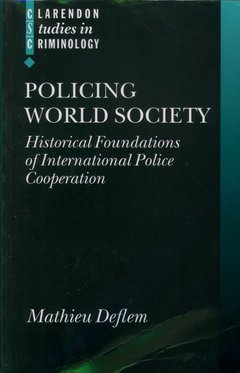Description
Policing World Society
Historical Foundations of International Police Cooperation
Clarendon Studies in Criminology Series
Author: Deflem Mathieu
Language: English
Subject for Policing World Society:
Policing world society historical foundations of international police cooperation
Publication date: 03-2004
320 p. · 13.8x21.6 cm · Paperback
Publication date: 03-2004
320 p. · 13.8x21.6 cm · Paperback
Policing world society historical foundations of international police cooperation
Publication date: 11-2002
318 p. · 14.4x22.4 cm · Hardback
Publication date: 11-2002
318 p. · 14.4x22.4 cm · Hardback
Description
/li>Contents
/li>Biography
/li>Comment
/li>
This book offers a sociological analysis of the history of international police cooperation in the period from the middle of the 19th century until the end of World War II. It is a detailed exploration of international cooperation strategies involving police institutions from the United States and Germany as well as other European countries. The study provides a rich empirical account of many dimensions in the history of international policing, including the role of police in the 19th-century movement towards national independence; evolution from political cooperation towards international criminal enforcement; international policing aspects of the outbreak of World War I and the Bolshevik Revolution; the early history of international police organizations, including Interpol; the international implications of the Nazification of the German police; and the rise on the international scene of the Federal Bureau of Investigation. To account for these historical transformations, this book develops an innovative theoretical model of bureaucratization based on the sociology of Max Weber and theories of globalization. It is argued that international police cooperation is enabled through a historical process of police agencies gradually claiming and gaining a position of relative independence from the governments of their respective states. Furthermore it shows that international police cooperation relies on expert systems of knowledge on international crime, which police institutions across nations develop and share. Paradoxically, in spite of this spirit of cooperation, national concerns of participating forces remain paramount.
Introduction: Historical Foundations of International Police Cooperation, 1: The Rise of International Policing, 2: The Expansion of World Society, 3: Towards an International Criminal Police, 4: War and Revolution, 5: The Origins of Interpol, 6: Policing Across National Borders, 7: On the Road to War: The Control of World Policing, 8: Policing the Peace and the Restoration of World Order, Conclusion: Patterns and Dynamics of International Policing, Appendix 1: A Chronology of International Policing, Appendix 2: A German-US Dialogue on Policing and Criminal Justice, Appendix 3: Archives and Libraries
Mathieu Deflem is Assistant Professor of Sociology at the University of South Carolina, and previously helds positions at Purdue University and Kenyon College. A former native of Belgium, he studied sociology and anthropology at universities in Belgium and England, before he migrated to the United States and obtained a Ph.D. in sociology from the University of Colorado. His research specialties include international criminal justice, crime and social control, abortion policy, sociolegal studies, and theoretical sociology. Deflem is elected Chair of the Law and Society division of the Society for the Study of Social Problems. He is also newsletter editor of the Sociology of Law section of the American Sociological Association, and website developer for the same organization's Comparative and Historical Sociology section.
© 2024 LAVOISIER S.A.S.




